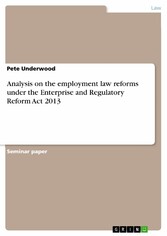Suchen und Finden
Analysis on the employment law reforms under the Enterprise and Regulatory Reform Act 2013
Mehr zum Inhalt

Analysis on the employment law reforms under the Enterprise and Regulatory Reform Act 2013
Seminar paper from the year 2014 in the subject Law - Miscellaneous, grade: Comendation, University of the West of England, Bristol (Bristol), course: LL.M LPC, language: English, abstract: This report aims to provide an analysis on some of the employment law reforms under the Enterprise and Regulatory Reform Act 2013. The coalition government have implemented some substantial changes that have affected the way in which employment law works in practice. The changes reviewed are; the change in qualifying dismissal, the introduction of tribunal fees, ACAS mandatory conciliation and pre-termination negotiation. Methods of analysis include, obtaining information from the department for business and industry and ACAS comparing the amendments in the law with figures from the office of national statistics with a view to establishing a correlation between the reforms and the employment statistics. This report also focuses on comments from secretaries of state and legal commentators to compare the differing viewpoints and establish the potential effect against intended impacts. Results of the analysis into the reforms show that there is almost certainly an infringement on basic workers' rights. The infringements come in the form of increasing qualifying periods, introduction of tribunal fees and adding additional steps for potential claimants to complete before they can bring any claim against an employer. Commentators describe the reforms as attacks and ask questions as to access to justice. The reforms have even prompted a large employment union to bring a judicial review case against the government. This report concludes that whilst there is the potential for these reforms to have a significant detrimental effect to employees and workers individually, overall on a collective basis the benefit has greater potential to increase employment rates. The implementation of the changes has reduced the fear factor and perceived risk of hiring employees and can be seen to a raise employment statistics and have a more flexible working environment leading to a better employment relationship between employer and employee.
Alle Preise verstehen sich inklusive der gesetzlichen MwSt.








